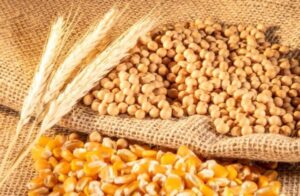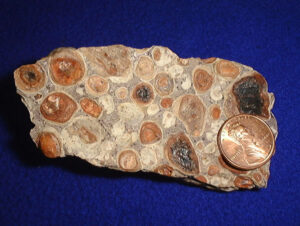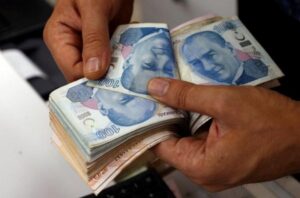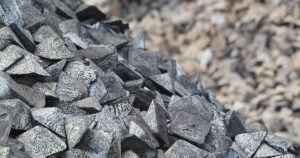
In January-September 2024, Ukraine exported $1.98 billion worth of agricultural products to Turkey and would like to deepen cooperation in the agro-processing industry, Ukrainian Minister of Agrarian Policy and Food Vitaliy Koval said at a meeting with Turkish Ambassador to Ukraine Mustafa Levent Bilgen in Kyiv on Tuesday.
“Ukraine and Turkey complement each other in the agricultural sector. We need to deepen cooperation between the countries, in particular in the agro-processing industry, and move together to new markets,” the press service of the Ministry of Agrarian Policy and Food quoted him as saying.
The Minister noted that Turkish agro-processing companies can find new high-quality markets for their business in Ukraine. This will be beneficial for both countries. Also, Ukraine and Turkey can cooperate in the export of cattle and small cattle meat. Turkey’s experience in irrigation is important for Ukraine. Especially after the Kakhovka dam was blown up.
Koval thanked Turkey for its involvement in ensuring food security. In particular, for participating in the humanitarian initiative of Ukrainian President Volodymyr Zelenskyy “Grain From Ukraine”, under which Ukrainian grain is supplied to countries on the African continent.
The Minister of Agrarian Policy invited his Turkish counterpart to discuss further cooperation in agriculture.
For his part, Mustafa Levent Bilgen noted that Turkey appreciates cooperation with Ukraine, particularly in the agricultural sector. However, it understands the importance of the Ukrainian economy and ensuring the world’s food supply through grain exports.
The Turkish Ambassador assured of continued support for Ukraine and expressed readiness to deepen cooperation.

The Interdepartmental Commission on International Trade (ICIT) has imposed provisional anti-dumping duties on imports of radiators originating in Turkey and China in the amount of 41.86% and 42% respectively.
According to the ICIT’s announcement in the Uryadovy Courier newspaper on Friday, the decision comes into force five days after the date of publication of the announcement.
The announcement recalls that the anti-dumping investigation was initiated by the ICIT decision of 12 April 2024 based on the complaint of Ukrainian producers Sun Tech Paradise LLC and UTERM Ukraine LLC, whose share in the overall proceedings in Ukraine exceeds 50%.
The ICMT found that during the study period (January 1, 2023 – March 31, 2024), the financial and economic indicators of the national producer deteriorated, in particular, the volume of production – by 74.56%, production capacity – by 13.75%, capacity utilization – by 70.5%, and the volume of sales in the Ukrainian market – by 40.97%.
In addition, the financial result from the sale of goods deteriorated by 1606.24%, labor productivity by 59.47%, and the volume of investments in dollar terms by 78.69%.
The Commission also points out that in the first quarter of 2024, the volume of imports of radiators from Turkey and China increased by 157.13% compared to the same period in 2023 and by 21.9% compared to the first quarter of 2021.
The ICIT report also notes that the losses to the national producer from dumped imports of radiators from Turkey and China are confirmed by the fact that the volume of imports from these countries during the study period increased by 31.27% in terms of consumption of such goods in Ukraine and by 173.29% in terms of production.
The anti-dumping measures are applied to heating radiators (steel, aluminum, bimetallic) (excluding towel rails, water floor convectors and designer radiators) classified under UKT VED codes ex 7322 19 00 00, ex 7616 99 10 00, ex 7616 99 90 00.
San Tech Paradise LLC (Odesa region) manufactures plumbing products for heating, water supply, and sewage. According to its website, it has two factories in Ukraine (130 thousand square meters of production space) and produces 20 thousand tons of products per year. The company exports its products to Poland, Romania, Lithuania, Bulgaria, Georgia, and Mongolia, among others.
According to Opendatabot, in 2023, the company reduced its net profit by 40% compared to 2022, to UAH 61.2 million, while net revenue increased by 15.3% to UAH 552.2 million.
The company is owned by Andriy Kovalenko and Oleksandr Bozhko (50% each).
“UTERM Ukraine (Bila Tserkva, Kyiv region) has been operating in the steel panel radiator market since 2013.
According to Opendatabot, in 2023, the company earned UAH 6.7 million in net profit, compared to UAH 0.4 million a year earlier, with net revenue falling by 48.6% to UAH 124.3 million. The company is owned by four entrepreneurs with equal shares of 25% each.

In January-September this year, Ukraine increased imports of aluminum ores and concentrate (bauxite) in physical terms by 99.8% compared to the same period last year, up to 19.528 thousand tons. According to statistics released by the State Customs Service on Tuesday, bauxite imports in monetary terms increased 2.2 times to $2.435 million during the period.
The imports came mainly from Turkey (77.38% of supplies in monetary terms), China (19.42%) and Spain (3.20%).
Ukraine did not re-export bauxite in the same period of this year as in January-September 2013.
As reported, in 2022, Ukraine reduced imports of aluminum ore and concentrate (bauxite) in physical terms by 81.5% compared to the previous year – to 945.396 thousand tons. Imports of bauxite in monetary terms decreased by 79.6% to $48.166 million. Imports were mainly from Guinea (58.90% of supplies in monetary terms), Brazil (27.19%) and Ghana (7.48%). In 2023, Ukraine imported 19,830 thousand tons of bauxite worth $2.360 million.
Bauxite is an aluminum ore used as a raw material to produce alumina, which is used to make aluminum. They are also used as fluxes in ferrous metallurgy.
Mykolaiv Alumina Plant (MAP) imports bauxite to Ukraine.

Turkey has allocated Ukraine the last package of 1 thousand licenses for transportation to / from third countries in accordance with the agreement reached at the end of 2023, said the Deputy Minister of development of communities, territories and infrastructure Sergiy Derkach.
“Plus 1 thousand permits from Turkey for transportation to/from third countries. Ukrainian carriers can continue to perform transportation to / from third countries with Turkey. The corresponding forms of permits are already in “Ukrtransbezpek” and are available for ordering,” Derkach wrote on Facebook on Wednesday.
According to him, the permits were issued in accordance with the agreement that was reached at the end of 2023, which will allow to close the need before the end of the year.”
“I will remind you that earlier this year, for the first time since 2018, we managed to agree with Turkey to increase the number of such permits by 40% – up to 3,500,” Derkach wrote, indicating that the market has already used 2,500 permits.
The Deputy Minister recalled that bilateral and transit traffic between Ukraine and Turkey do not require permits, as freight traffic between the countries is liberalized. “Visa-free” will be valid at least until the end of martial law.

Consumer prices in Turkey in September increased by 49.4% in annual terms, according to a report by the country’s statistical institute (Turkstat). The growth rate slowed from 52% in August and was the lowest since July 2023. The weakening of inflation was noted for the fourth consecutive month.
The consensus forecast of experts, cited by Trading Economics, assumed an even more significant slowdown in consumer price growth – to 48.3%.
The increase in the cost of food and non-alcoholic beverages in September slowed to 43.7% from 44.9% in August, transportation services to 26.6% from 29%, and utilities to 97.87% from 101.49%. Prices in hotels, cafes and restaurants increased by 65.41% (+67.7% a month earlier), alcohol and tobacco products went up by 52.35% (+60.94%), educational services by 93.59% (+120.81%), and medical services by 50.7% (+53.49%).
Consumer prices in Turkey in September increased by 2.5% compared to the previous month after rising by 3.2% in August.
Producer prices (PPI index) in the country last month increased by 33.09% in annual terms and by 1.37% in monthly terms, Turkstat reported. In August, they rose by 35.75% and 1.68%, respectively.
The Turkish Central Bank has kept its key interest rate at 50% since March this year, and tight monetary policy has helped to ease inflation. Back in June 2023, the rate was at 8.5%.
Trends in the global and Ukrainian economies can be tracked via the Experts Club information and analytical channel – https://www.youtube.com/@ExpertsClub

In January-August this year, Ukraine reduced pig iron exports in physical terms by 19.8% compared to the same period last year, to 749.454 thousand tons. According to statistics released by the State Customs Service (SCS) on Friday, pig iron exports in monetary terms decreased by 19.6% to $286.447 million during the period.
At the same time, exports were carried out mainly to the United States (66.28% of supplies in monetary terms), Italy (10.03%) and Turkey (9.85%).
In the first eight months of the year, the country imported 15 tons of pig iron worth $37 thousand from Germany (in January, March, May, June, July and August, there were no imports), while in the same period in 2023, it imported 65 tons of pig iron worth $97 thousand.
As reported, in 2023, Ukraine reduced pig iron exports in physical terms by 5.8% compared to 2022 – to 1 million 248.512 thousand tons, while exports in monetary terms decreased by 26.2% to $471.467 million. Deliveries were made mainly to Poland (51.91% of supplies in monetary terms), Spain (21.41%) and the United States (13.15%).
In 2023, Ukraine imported 154 tons of pig iron worth $156 thousand from Germany (42.31%), Brazil (41.67%) and Poland (16.03%), compared to 40 tons of pig iron worth $23 thousand in 2022.